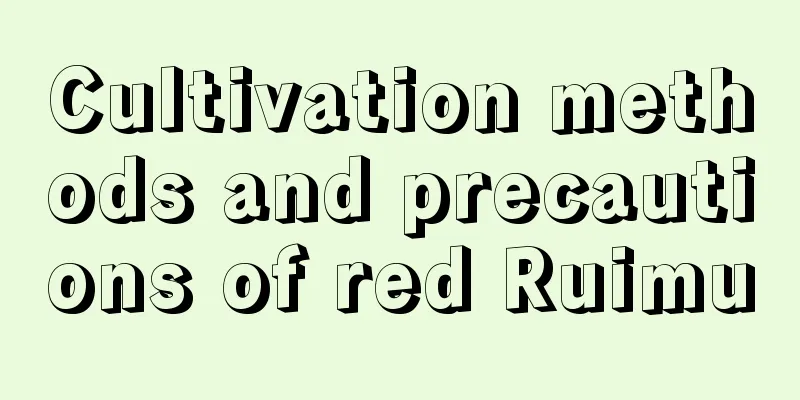Cultivation methods and precautions of red Ruimu

How to cultivate red yewsoilWhen growing red yew, you can choose fertile, well-drained soil. Before planting, you need to apply some base fertilizer to ensure the fertility of the soil. When planting red yew, you can bring a little garden soil, which is more conducive to the survival of red yew. Light and temperatureRed yew likes a warm growing environment and requires sufficient light. It has strict requirements on temperature, and the suitable temperature for growth is between 22℃ and 30℃. It can tolerate cold, but it will be damaged by frost in some places in the north, and in severe cases it can cause death. Water and fertilizer managementRed yew likes moist and fertile soil. It will grow faster if the drainage is smooth and the nutrients are sufficient. Some base fertilizer should be applied before planting, and then topdressing should be carried out, such as some decomposed farmyard manure or organic fertilizer. You can also apply some compound fertilizer according to the growth conditions. Watering should be appropriate, depending on the growth conditions of the red yew. In spring, water should be used to help the plant grow green again, and in winter, water should be used to prevent freezing. In rainy seasons, pay attention to drainage to avoid waterlogging and root rot. Precautions for breeding of red ruimuReproductionThere are three methods of propagating red yew, including sowing propagation, cutting propagation and layering propagation, which can generally be carried out in spring. pruneThe red yew is a plant that is very resistant to pruning. Proper pruning in the autumn of each year can maintain the tree shape and facilitate flowering and fruiting. In the spring, proper pinching can be done to promote the growth of side branches and make the plant fuller. Pests and diseasesDuring its growth process, red yew will be harmed by diseases such as leaf spot, powdery mildew and stem rot, as well as pests such as aphids and yellow thorn moth. It is necessary to do a good job in disease and pest prevention and control to nip the harm in the bud in time. |
<<: Cultivation methods and precautions of multi-flowered wild peony
>>: Cultivation methods and precautions of closed sheath ginger
Recommend
Do plants need watering every day?
Do you water your plants every day? Plants genera...
What are the cultivation methods and precautions of osmanthus
Osmanthus Introduction Sweet osmanthus is a plant...
What fruits are suitable for growing in Nanyang?
Nanyang planting climate conditions The Nanyang B...
Sweet Osmanthus Growth Environmental Conditions and Characteristics
Sweet Osmanthus Growth Environmental Conditions a...
How to grow green vegetables
1. Land preparation First select a piece of land,...
Bury a quail egg at the bottom of the pot, and the flower will grow strong and vigorous and grow like crazy!
Bury quail eggs at the bottom of the pot, and the...
Is aloe vera suitable for deep or shallow pots?
Should I use a deep or shallow pot for aloe vera?...
Cultivation methods and precautions of alpine banyan
The mountain banyan has broad and thick leaves, w...
Winter care of Gloxinia
1. Low temperature treatment In winter, when the ...
The efficacy and function of sunflower
Medicinal effects Clearing away heat When we have...
What should I do if my rabbit won’t eat?
Rabbit is an animal with high economic value. It ...
Disease prevention and control of peace thyme
Anthracnose of Peace Tree Symptoms Anthracnose ma...
I just want to ask you, do you dare to grow flowers like this in the bathroom?
The fully open-air bathroom has lotus flowers out...
How to grow calamus bonsai
1. Reasonable division The plants need to be divi...
Methods and precautions for propagation of tiger tail orchid by cuttings
How to propagate tiger tail orchid There are many...









